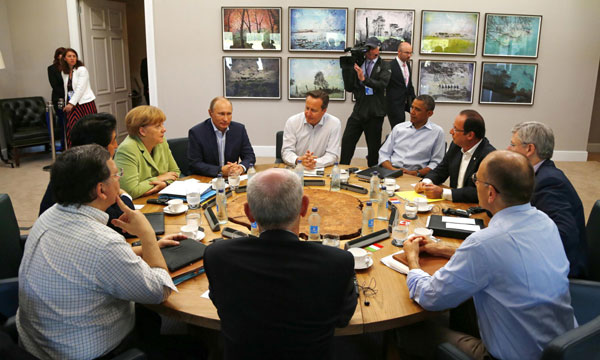G8 members compare notes on Syria at summit
Updated: 2013-06-19 15:44
(Xinhua)
|
||||||||
LOUGH ERNE, United Kingdom - The G8 summit closed on Tuesday amid consensuses, compromises and differences over various issues, in particular the Syria crisis this time.
Whatsoever, all the G8 members hoped the Syria issue could be solved, and British Prime Minister David Cameron, the host of this summit, called on all parties to implement their consensus to help Syria end its domestic conflict.
COMPROMISE ON SYRIA ISSUE
After the two-day summit in Lough Erne, Northern Ireland, Cameron announced the G8 leaders have reached consensus over pushing the related peace talks on the Syria issue and will press Syria's conflicting sides to join the talks as soon as possible.
Meanwhile, the group has decided to add $1.5 billion of humanitarian aid to the war-plagued country.
G8 members condemned the use of chemical weapons in Syria by any sides and agreed to help Syria get rid of terrorists and extremists through cooperation.
They support a new international conference on Syria and back establishing a transitional governing body in Syria to govern the country as agreed last year in Geneva, Switzerland.
However, this latest G8 position, or consensus, did not mention Syrian President Bashar al-Assad's fate as well as the offer of weapons to the Syrian opposition. It neutrally condemned any side's use of chemical weapons. This showed the USand its six G8 allies failed to reach broad consensus on the issue with Russia.
Avoiding any decisions on these issues was a comprise as Russia pressed.
The G8 consensus stressed its common goal of ending violence in Syria, agreed to bring the conflicting sides in Syria into peace talks with the "maximum diplomatic pressure", and recognized the existence of terrorist and extremist forces in Syria.
This shows that G8 has recognized the importance of a political and diplomatic solution to the current Syria crisis and the Western lineup on the Syria issue was being shaken.
In view of US and European countries' compromise, Russia has to announce its stance on the power handover in Syria. This G8 consensus reaffirmed that the next step is to establish a transitional governing body to realize power change in Syria, with the operation of major institutions in Syria guaranteed to avoid any "power vacuum". That means that a significant number of officials might remain.
- G8 focuses on taxation, counter-terrorism at final day
- Inside the G8 summit
- G8 kicks off amid controversy
- Obama, Putin face tough talks at G8 summit
- Anti-G8 protests aim for Canary Wharf banking district
- Deep concerns over DPRK aired at G8 meeting
- G8 FMs urge DPRK to calm down
- G8 meets to discuss Syria and DPRK

 Michelle lays roses at site along Berlin Wall
Michelle lays roses at site along Berlin Wall
 Historic space lecture in Tiangong-1 commences
Historic space lecture in Tiangong-1 commences
 'Sopranos' Star James Gandolfini dead at 51
'Sopranos' Star James Gandolfini dead at 51
 UN: Number of refugees hits 18-year high
UN: Number of refugees hits 18-year high
 Slide: Jet exercises from aircraft carrier
Slide: Jet exercises from aircraft carrier
 Talks establish fishery hotline
Talks establish fishery hotline
 Foreign buyers eye Chinese drones
Foreign buyers eye Chinese drones
 UN chief hails China's peacekeepers
UN chief hails China's peacekeepers
Most Viewed
Editor's Picks

|

|

|

|

|

|
Today's Top News
Shenzhou X astronaut gives lecture today
US told to reassess duties on Chinese paper
Chinese seek greater share of satellite market
Russia rejects Obama's nuke cut proposal
US immigration bill sees Senate breakthrough
Brazilian cities revoke fare hikes
Moody's warns on China's local govt debt
Air quality in major cities drops in May
US Weekly

|

|








